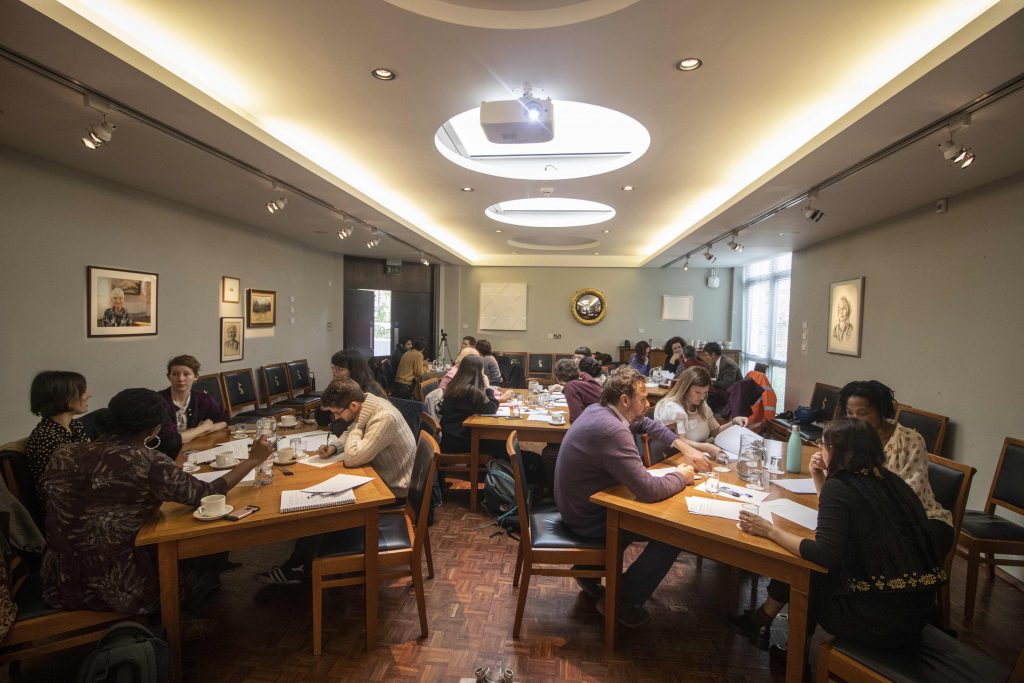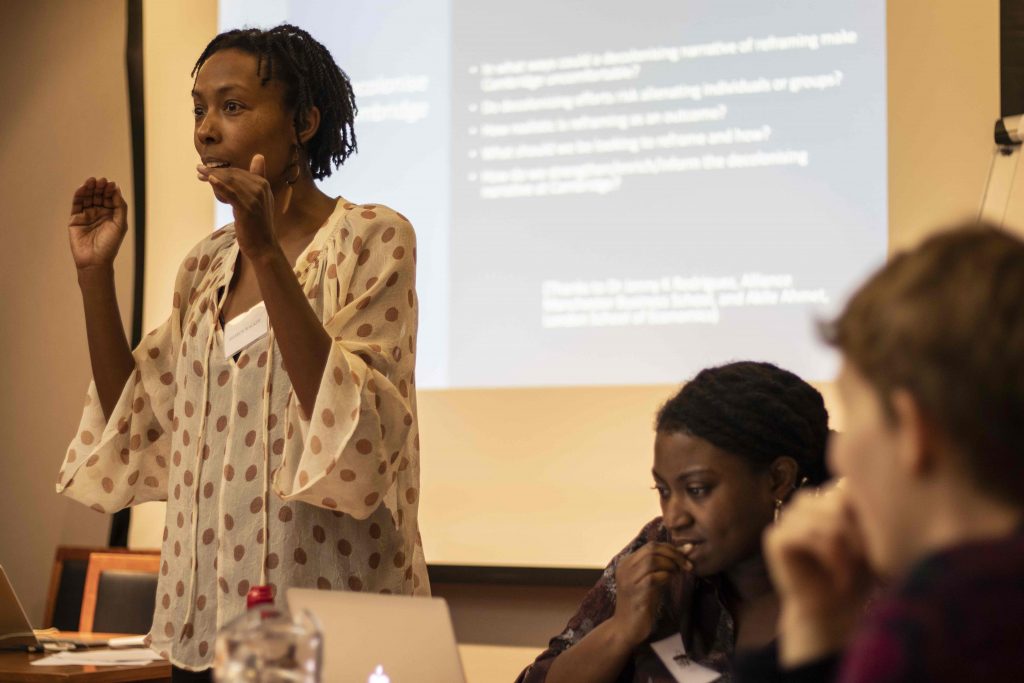By Chris Jeppesen, Sharon Walker, and Laura Carter //
Working with our colleague Sharon Walker (Faculty of Education) and supported by the University Diversity Fund, SESC ran a day-long workshop for staff and students at the University of Cambridge in November 2019, entitled Anti-racist education: history, theory, practice. The workshop asked how an anti-racist agenda might look different to the University of Cambridge’s current emphasis on diversity and inclusion. We described the day in an earlier blog (available here) but want to return to these themes now having followed-up with participants at the end of March, to ask how their experience of the workshop had influenced their subsequent practice.
The feedback we received was encouraging. Responses illuminated the various ways in which individuals working across the university have made an anti-racist agenda more central in their everyday work and have developed initiatives to disseminate these ideas more widely. As one participant observed:
‘It made me realise yet again how easy it is to move backwards, to lose gains that were made in the past, and I sometimes use this in my training to make people realise that we cannot take things for granted, anti-racism needs active constant engagement and we need to support open honest conversations about race and racism.’
Respondents also highlighted, however, their desire for a more coordinated and forthright approach from the central university, with one writing:
‘I think it would be even more impactful if there could be a way of extending it beyond the people who are already interested in these themes. It would also be useful to speak to people who are involved in anti-racism and diversity work at the University of Cambridge, to hear their experiences and how we can support them.’

It was always our intention to make the recordings and resources from the workshop available here on the project website (you’ll find the links below, at the bottom of this post); however, in light of ongoing global protests against racial violence and discrimination, this now feels even more pressing. The need to address ongoing educational inequalities is a central theme in demands for change.
History matters in this regard. In recent weeks, media and public debate in the UK has highlighted how divergent interpretations of the past continue to inform structural, institutional, and everyday forms of racism in the present. Controversies surrounding the public presence of statues that memorialize individuals who profited from slavery or strove to sustain racialized structures of power have focussed critical attention on the national narratives that many collectively nourish and celebrate.
This has driven a more fundamental questioning of how these histories are taught in schools and universities. While calls to decolonize university curricula have been made for some years now, the last month has seen mounting appeals for immediate reform of the school curriculum to include compulsory and dedicated study of Black British History and more critical approaches to the teaching of the British empire. As you will see in the resources below, these echo similar demands made by anti-racist campaigners and people of colour from the 1970s onwards. In recent weeks we have seen a fragile consensus emerge within white communities about their own embedded privileges. Again, anti-racist education campaigners have long argued that whiteness is a social construction in need of deconstruction.
Despite recent optimistic proclamations by some policymakers and commentators on the right, these historical insights underscore the limits of progress over the intervening decades [1]. These ideas were central to the discussions we had during the workshop, especially in the session led by Sharon Walker and during the keynote by Meleisa Ono-George, and which resonated powerfully with participants:
‘I will never forget about what Sharon Walker said about the use of the word “diversity” and how it positions whiteness as the norm. I cringe every time I hear the word now.’

What the recent protests make abundantly clear is that the rhetoric of equality of opportunity for all children put forward in the 1944 and 1988 Education Acts remains woefully unfulfilled for many pupils of colour. This makes the vital work carried out by a range of education think tanks, professional associations, and individual teachers even more important to recognise. Since 1968, the Runnymede Trust has carried out in-depth research into the ways in which race and ethnicity shape opportunity in British education and has worked relentlessly to lobby policymakers to address ongoing inequalities. In 2017 the Trust collaborated with teachers, museums, and university-based academics to create a new teaching resource entitled Our Migration Story, which explores Britain’s long history of engagement with the wider world and supports several new GCSE History module options. The ongoing work of two of SESC’s project partners, the Historical Association and The Sutton Trust, provides resources and research to help teachers, policymakers, parents, and pupils engage with and understand questions of educational inequality.
At a university level, the Royal Historical Society has been seeking to establish new collaborations and strategies to address its findings in Race, Ethnicity & Equality Report (2018). Scores of teachers and lecturers across the country have shared their resources and lesson plans to help others integrate Black British histories and perspectives into their teaching, which the Runnymede Trust and Institute of Historical Research are currently gathering into a resource bank. All this work should remind us of something too often forgotten: the history of race in Britain has been characterised by exclusion, discrimination, and inequality. But it is also the history of activism, resistance, and constant questioning of power by people and communities of colour and their allies.
We are aware that our workshop makes only a small contribution to the scope of initiative that is already underway, but we hope the resources below will be of interest and use in these ongoing debates. We have four recordings that include material presented by session leaders. This was followed by wider discussion amongst workshop participants, but this was not recorded. We also include links to the source material and slides from presentations from the day.
[1] Bridget Byrne, Claire Alexander, Omar Khan, James Nazroo, & William Shankley (eds.), Ethnicity, Race and Inequality in the UK (Bristol: Policy Press, 2020)
Recordings & resources
Welcome and introduction
Sharon and Laura introduce the day and wider themes of interest
- Listen here [8 mins]
Session 1: History
This comprises the introductory segment to an interactive source-based activity that looked at the history of anti-racism in London schools in the 1970s and 80s. In the introduction, Chris and Laura give some background on race and secondary education in the 1970s and the ways in which the Inner London Education Authority [ILEA] started to introduce anti-racist initiatives in the 1980s.
Session 2: Theory
Sharon considers the wider theoretical and conceptual debates around anti-racism within the current context of the Decolonizing movement.
- Listen here [41 mins]
- Powerpoint presentation here
Session 3: Keynote: Dr Meleisa Ono-George, ‘Active Anti-Racism, Higher Education, and Transformational Change’
Our keynote speaker Meleisa Ono-George (University of Warwick) discusses the urgent need for more anti-racist initiatives within universities and how this has been approached at the University of Warwick.